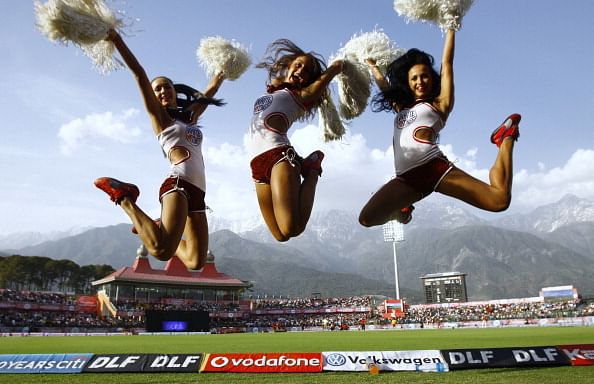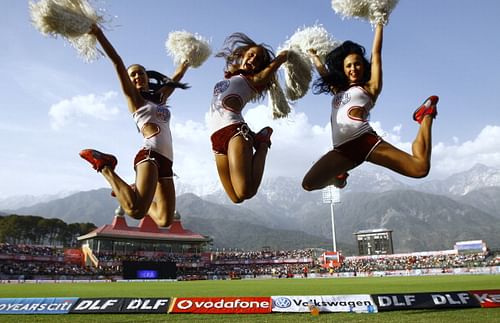
From small town hero to liability - the lovechild of IPL and match-fixing
 If you thought the cricketing summer was getting monotonous, think again. If you thought the IPL was getting predictable, think again. If you thought that controversies were getting dreary, think again. As if the daily dose of entertainment isn’t quite adequate, the Indian Premier League now brings you the father of all controversies – a match-fixing scandal. And you ask the scapegoats this time? Winner of two World Cups – Santakumaran Sreesanth, along with two other teammates – Ankit Chavan and Ajit Chandila.
If you thought the cricketing summer was getting monotonous, think again. If you thought the IPL was getting predictable, think again. If you thought that controversies were getting dreary, think again. As if the daily dose of entertainment isn’t quite adequate, the Indian Premier League now brings you the father of all controversies – a match-fixing scandal. And you ask the scapegoats this time? Winner of two World Cups – Santakumaran Sreesanth, along with two other teammates – Ankit Chavan and Ajit Chandila.
Such a scam in such a mega event in the country and one of the most glamorous sporting events in the world is disturbing itself, more so because the team involved is Rajasthan Royals. That these players have been playing under a mammoth gentlemanly figure like Rahul Dravid makes it worse. The Royals have been in fine nick this season, thanks to some immaculate display of captaincy by Dravid, who holds the cleanest image in the cricketing world. Such a sudden and disappointing out turn of events is surely going to hamper their confidence and easy-going. This scandal, if verified with evidence, will not only disrupt the credentials of the IPL, but also put a question mark over cricket as a team game.
Rumours of IPL being fixed had been there from the very onset of the cash-rich tournament, but all of them had been chanted by cynical critics. This, if proved, will be the first major establishment of the fixing-fantasy and a huge setback in itself for the event.
Looking at the targets – Chandila, Chavan and Sreesanth, one gets to discover a similarity. All of them have emerged as small town heroes who’ve shot to fame by making it count on the big stage. Match-fixing is a serious problem, the root cause of which is more than just intriguing.
One has got to see the IPL from the players’ perspective. Born and brought up in small towns that didn’t present them with affordable facilities and opportunities, most of the players have fought the battle of survival and learnt to live life the hard way. A difficult upbringing has erased failure as an option and they have learnt to endure the rigours of reality. Hailing from such an unstable background, one cannot really blame them for biting the juicy apple – the Indian Premier League. The glamour, the instant fame, and above all, the economic security that this cash-rich tournament promises are hard to overlook. Getting a chance to don the national colours is a distant dream for most of them; so immediate recognition in IPL jerseys is motivation enough for these guys. Raised in families that struggled to meet the basic necessities, education has been nothing less than a burden whose weight they have been incapable of carrying. So here comes a rich pool of talent, young and impressionable, uneducated (or barely educated) and blunt, keen to make a mark and earn the much sought-after security.
IPL has most certainly bridged the gap (if ever there was one) beautifully between the small and big towns, and the franchisees deserve equal credits for recognising talents from the interiors of the country. The tournament has provided the ideal platform to the small town heroes for showcasing their talent in front of millions, and yet above all of this, there looms a large loophole. The IPL has brought impressionable minds to the mainstream, but has forgotten to educate them on the mockery of the centre stage. Most of these players are scarcely aware (if not fully unaware) of the ICC Codes and the rules and regulations in the politics of the sport. Thus, all these make them a soft target for the bookies, who are most eager to snoop around like an eagle and pick up the gullible ones for selfish motives. In retrospection, all that the IPL is doing is turning these vulnerable cricketers into liabilities! Not only is it sending the wrong message to the morals of the players themselves, but also to the ethics of the sport. IPL is intended to develop professionalism among maturing cricketers, not to give birth to Md. Aamirs.
The primary need of the hour is to ensure cricketers receive education on the very basics of the ethical face of cricket, or in that juncture – every sport. The IPL Committee and the franchisees must come forward in guiding the players and educating them on the ramifications of conning. Clear guidelines and proper surveillance shall work. It may be worth mentioning here that the new Yorkshire County Cricket coach, Jason Gillespie, had expressed his opinion in favour of coaches and managers realising that it’s part of their duty to counsel players regarding match-fixing and the dangers that come complimentary to it. The WADA and ICC must ensure better network of communication to the different local tournaments round the world in order to curb this menace.
Match-fixing and gambling are pests. They can never be eradicated, but yes, they can be controlled. With IPL once again reminding cricket of its responsibilities, a fan only hopes the officials do enough to save his beloved sport of further stain.